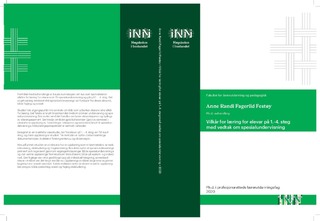Vilkår for læring for elevar på 1.-4. steg med vedtak om spesialundervisning
Doctoral thesis
Permanent lenke
http://hdl.handle.net/11250/2640609Utgivelsesdato
2020Metadata
Vis full innførselSammendrag
Formålet med avhandlinga er å auke kunnskapen om kva som kjenneteiknar vilkåra for læring for elevar som får spesialundervisning og går på 1. – 4. steg. Det er gitt særleg merksemd til spesialundervisninga sin funksjon for desse elevane, både fagleg og sosialt. Det overordna forskingsspørsmålet er Kva kjenneteiknar vilkåra for læring for elevar på 1. – 4. steg som har vedtak om spesialundervisning? Eg har valt å ta utgangspunkt i tre sentrale område som påverkar elevane sine vilkår for læring. Det første er knytt til sambandet mellom ordinær undervisning og spesialundervisning. Det andre området handlar om lærarelevrelasjonen og tydinga av elevengasjement. Det tredje området gjeld koherensen (grad av samsvar) i aktørane si oppleving av forventingar, relasjonar og samarbeid knytt til spesialundervisninga.
Kunnskapsgrunnlaget i studien er todelt. Det er for det første lagt vekt på å sjå vilkåra for læring for denne gruppa elevar i ein overordna historisk samanheng. Dernest er teori om inkludering, koherens og læring grunnleggande. Designet er ein kvalitativ casestudie, der eg følgde fire elevar på 1. – 4. steg, ein frå kvart steg, og deira opplæring. Eg nytta tre metodar i datainnsamlinga: dokumentanalyse, kvalitativt forskingsintervju og observasjon. Dokumentanalysane var gjennomført på t.d. kartleggingar, sakkunnig vurdering, vedtak om spesialundervisning og individuelle opplæringsplanar. Respondentane i intervjua var elevane, føresette, assistent, spesiallærar/-pedagog, kontaktlærar og skuleleiing. Observasjonane var gjennomført i både ordinær undervisning og spesialundervisning.
Hovudfunnet i studien er at elevane har ei opplæring som er kjenneteikna av svak inkludering, ekskludering og fragmentering. Resultata synte at spesialundervisninga primært vart organisert gjennom segregerte løysingar. Både spesialundervisninga og den samla opplæringa framstod som lite koherent, både på system- og individnivå. Det faglege var i stor grad bygd opp på individuell tileigning, samarbeid elevar i mellom var det langt mindre av. Opplæringa er såleis langt meir avgrensa kognitivt enn sosialt orientert. Samla indikerer dette at eleven si samla opplæring ber preg av både personleg, sosial og fagleg ekskludering. Inkludering ser ut til å vere ein sovande ideologi. The purpose of this dissertation is to increase the knowledge of what characterizes education for pupils receiving special education in Form 1 – 4 in Norwegian primary school, with particular focus on the function of special education, both academically and socially. The main research question is What characterizes learning conditions for pupils in Form 1 – 4 who have an individual decision on special education? To answer this, I have chosen three central areas which has an influence at the pupils’ conditions for learning. The first area is the relation between ordinary education and special education. The second area concerns the teacher-pupil relationship and engagement in learning. The third area is how pupils, parents and teachers experience the coherence in special education, due to expectations, relations and cooperation.
The knowledge base in this study is two folded. First, I have seen at the pupils’ conditions for learning in a historical context. Second, I present the theoretical basis in the study, theories of inclusion, coherence and learning. The design of the study is a qualitative case study. I studied four pupils receiving special education, one from each form 1-4 and collected data about their ordinary and special education. In the data collection I used three methods: document analysis, qualitative research interview and observation. Document analyses were conducted of e.g. expert assessment from the educational and psychological counselling service, individual decisions and individual education plans. The respondents in the interviews were the pupils, parents, an assistant, the special teachers, the form teachers and the school managements at the case schools. The observations were carried out both in ordinary education and special education.
The main finding shows that pupils’ special education is characterized by weak inclusion and fragmentation. Special education was primarily organized through segregated solutions, and appeared incoherent, both at the system level and individual level. The teaching was primarily based on individual acquisition of knowledge, and cooperation between the pupils was given less weight. Together, this indicates that the education of pupils’ receiving special education is characterized by personal, social and academic segregation. Inclusion seems to be a sleeping ideology.

